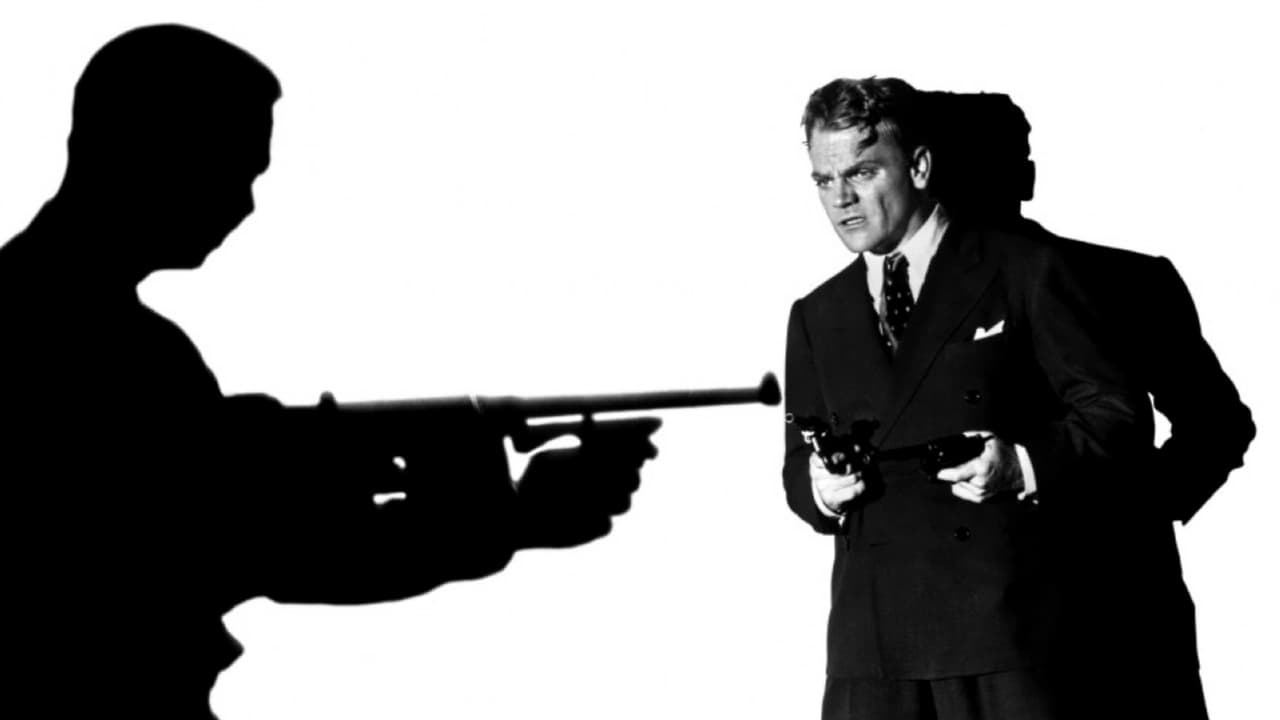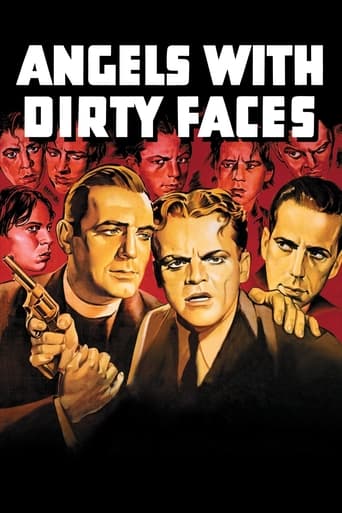Incannerax
What a waste of my time!!!
Pacionsbo
Absolutely Fantastic
Derry Herrera
Not sure how, but this is easily one of the best movies all summer. Multiple levels of funny, never takes itself seriously, super colorful, and creative.
Cristal
The movie really just wants to entertain people.
chuck-reilly
"Angels with Dirty Faces" (1938) is a classic Warner Brothers "morality" film from the 1930s that has a heavy-handed message that's banged over the heads of all viewers. That is, CRIME DOESN'T PAY. Case in point: James Cagney's character Rocky Sullivan. He goes astray at a young age and ends up a well-known gangster who returns to his old neighborhood to further his racketeering career. Standing in his way is his childhood friend, Father Jerry Connelly (Pat O'Brien at his sympathetic best). But when we examine their relationship closely, we realize that Rocky earlier had helped Jerry escape the police and then took the fall for him. In other words, Rocky is directly responsible for sending Jerry on the "straight and narrow' path, and inadvertently sending himself down a much darker road. Meanwhile, Rocky has to deal with lowlifes like his crooked lawyer and accomplice, Frazier (Humphrey Bogart in extreme sleaze-mode). Rounding out the cast of characters are the Dead End Kids including Billy Halop, Bobby Jordan, Huntz Hall and Leo Gorcey, as well as "Oomph Girl" Anne Sheridan thrown in as a love interest for Rocky. There's also plenty of unintentional humor tossed into this finely crafted film. You'll never look at a basketball game the same way after you watch the Dead End Kids take the court. In the end, Rocky once again saves Father Jerry from being rubbed out, this time by Frazier and his gang. So what does Rocky get for his good deed? He get an undeserved death sentence for knocking off Frazier and a few of his gang members. The dim-witted Connolly never figures out that it's been Rocky who's been saving his ass all these years. On the night of his execution, Father Jerry proposes to Rocky that he act like a coward when they drag him to the electric chair so the Dead End Kids won't idolize him. "It's about courage that only you, me and God will ever know," he explains in hallowed terms to Rocky. So after all he's done for this sap, now Rocky hears that he has to act like a sniveling coward in his final moments to satisfy the good Father. Of course, Rocky initially refuses him, but on the way to the execution chamber, Rocky starts crying like a baby. Father Connelly looks up to heaven as if to praise the Lord for this startling and unexpected turn of events. So the question to viewers over the years has always been this: was Rocky really a coward, or did he fake it to ensure that the Dead End Kids didn't idolize him anymore? The last scene in the film shows the Kids reading the screaming headline "Sullivan Dies a Coward!" and in total shock to learn that Rocky went out crying like a baby. They walk away stunned with Father Connolly and follow him to church like good little "Angels." The true answer: Rocky was no coward because Jimmy Cagney doesn't play cowards. End of story.
elvircorhodzic
ANGELS WITH DIRTY FACES is a film that has the original socio - critical message. The script and story are very allowed. Curtiz is in the heart of the story, but between two fires, put a rag-tag group of young. Interestingly, such a state viewed from the perspective of young boys. Criminals are always a role model. The time and place do not matter. Perception is dictated by socio - economic aspects of society.In this film, the main character is not only criminal but also the anti-hero. He was polished, charming, charismatic, accomplished, and of course rich. Rocky Sullivan played by James Cagney, is a portrait of the life times of such 'Angels with Dirty Faces "as the title of the film says. Rocky is not a bad person.This is a gangster movie, fast action and great culmination. The story is a complete and well rounded. The friendship of the two protagonists of this film is very strongly played. Cagney and O'Brien (Fr. Jerry Connolly) are excellent in their roles. Perhaps it is the strongest, which comes as the icing on the cake after a whole and dismissed the scenario, just what constitutes the epilogue of the story about two friends. The relationship of good and evil set through the prism of truth and falsehood. Friends are separated at an early age, others are bound heart and soul, and yet each had their fight. I wonder what would have happened if the roles were replaced at the beginning of the film? In the eyes of the world you can be anything. In the eyes of friends only one. The film is a dramatic and action equally good. Acting with visible improvisation, is at a high level. Bogart, Sheridan and Bancroft are not especially imposed.
Joseph Pezzuto
"Whadda ya hear! Whadda ya say!" 'Angels with Dirty Faces' (1938) could be seen as a great 30's crimefilm or an old-fashioned gangster flick. But the heart of its message is that it is about two roads and the two people that took the ones they chose, reaping and sowing from their travels in the end. The most powerful sermon directed by Michael Curtiz ('Casablanca', 'Yankee Doodle Dandy', 'Mildred Pierce'), 'Dirty Faces' centers on two youths growing up in one of New York's toughest neighborhoods: Hell's Kitchen. Jerry (Pat O'Brian) decides to wash the dirt of the sin-ridden district off of his hands and becomes a priest,as his buddy Rocky (James Cagney) gets caught up in racketeering in reform school. As a youth with Rocky, he too lead a life of crime,where his road to redemption began where he outran Rocky from the police and never looked back since. Years later, Rocky is released and returns to Hell's Kitchen, where he works and "mentors" at-risk children (The Dead End Kids) to eventually become tall and tough like himself one day. Though Rocky wants a temporary haven of safety with Jerry before resuming his life of crime, his old now-priest friend hesitates, testing their relationship, which is truly as rocky as the name of the man he hopes to lead in the way of the Lord. Which road does Cagney's character ultimately choose in the end? Let's take a look.To Father Jerry Connolly, the recreation center was a place that meant that there was a place of hope in the future for disgruntled boys that grew up in the hardship and poverty and could not be reformed for the greater good of mankind. It was a place where he faces the challenges of teaching these young boys like his misled friend Rocky once was the ways of becoming decent citizens in everyday society. It was a place where he knew the essence in the healthy reality and truth in which he spoke to the youths would be engrained and encouraged in their minds forever and that they could be redeemed of any future fatalities upon just listening within those very walls.Upon Rocky's return, I believe Father Connolly was right to turn against him, because after all the attempts to save him to keep his former friend from being corrupted, he just decided that it was no use in trying to change the mind of his gangster acquaintances. And being a priest, he also strongly believed in the imperial justice of criminal notoriety. If Connolly would have handled the situation and had been sticking his neck out for someone who just did not want to listen to reason but his own motives and intentions, he would have no choice but to count it all for loss and let the matter roll its terrible course of fate for itself. But that's just me.I believe that Rocky had a tiny glimpse of redemption just before his execution from what Connolly said to him. Nonetheless, he did not fully conform to redemption and was therefore still holding on to an empty void in his soul. He never actually tried to act or get better and ignored advice from his priest friend. This proves to Rocky and to the viewer that redemption is willing to be answered by anyone willing to accept it. Just before the execution of Rocky, Connolly comes in his cell and tells him to do him one last favor--to die pretending to be a screaming, sniveling coward, which would end the boys' idolization of him. However, Rocky refuses to crack and also the favor and insists that he will be "tough" to the end and not give up the one thing he has left: his pride. It is this last sustaining power before his doomed and chilling off-screen fall that he stubbornly clings to until he appears to change his mind and has to be dragged to the electric chair. The viewer is never told whether Rocky genuinely afraid, a "rotten sniveling coward", or if he truly does it for Connolly and the boys.Love, hate, redemption and loss all of roles to play as much as the characters do in this sobering picture and leaves one to thinking how minor changes in the beginning can lead to a slow fade of bleak despair if not careful. To the rapid-fire dialogue of Cagney, to the slow, wise words of O'Brian, and a bit part from a young Bogey, Angels with Dirty Faces still has the cinematic power today in saying to be wary of how we make our own personal choices in life, regardless whether if we are from one of the toughest neighborhoods in New York or a picket-fenced, green-grassed Suburbia. Each decision has its own benefit or consequence, where Jerry's road continued onward in providing hope and guidance to the orphaned youths, the one Rocky traveled had reached its needless end far too soon in the shocking (no pun intended) film's climax. Overall, a dynamic film that still carries with it after all these years a dynamic message.
tnrcooper
I imagine this was a ground-breaking film in 1938. It features some morally complex characters - Cagney as bad guy Rocky Sullivan who tries to get out of his life of crime and Laury Ferguson (Ann Sheridan) as a social worker whose feelings about Rocky soften over time. The fact that there is some ambiguity seems to me the progression of film becoming a means of showing moral complexity, a big shift from cinema's early days when the "nickelodeons" were forums for light entertainment.In any case in the film, Rocky and his friend Jerry (Pat O'Brien and William Tracy as a boy) grow up as toughs but Jerry changes his ways while Rocky goes to the penitentiary. When he gets out, he goes straight for a while but old ties drag him back in, courtesy of corrupt lawyer (Humphrey Bogart). The question is whether Rocky is really selfish or whether he cares about some of the rough street kids over whom he has developed a great influence because of his reputation.The script and story are great and the acting is great from all the primaries. Really well worth a look.

